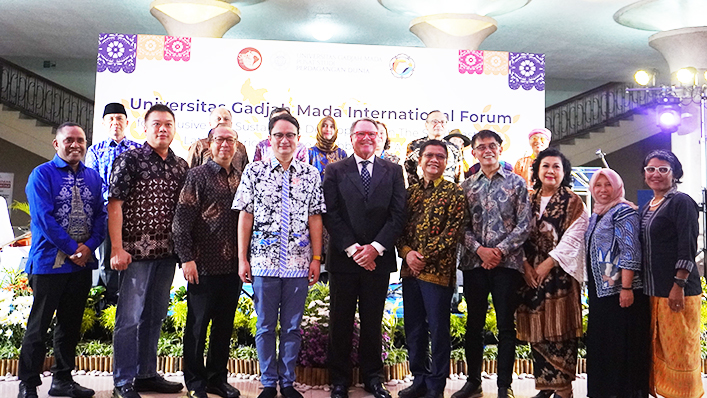
The Forum was organized by the WTO Chair established at UGM and the Forum for East Asia-Latin America Cooperation’s Southeast Asia, Latin America & the Caribbean Academic Dialogue Forum. The WTO Chair, led by Professor Riza Noer Arfani, implemented a project focusing on expanding and promoting knowledge co-production among various entities in developing countries based on the linkages between the WTO, international trade policy, and the circular economy from both regional and subnational perspectives. The project was provided support by the Netherlands under the WTO Chairs Programme (WCP).
Speaking at the opening ceremony, Deputy Director-General Xiangchen Zhang said: “At the WTO, members have considered circular economy related issues through policy dialogues similar to this one between academia and policymakers organised under the auspices of the Chairs Programme, but also through areas negotiated under the Committee on Trade and Environment. It is crucial that members improve their collective understanding of how trade flows, policies and regulations interact with the new approaches to a circular economy; we need to build trust and confidence to engage in mutually beneficial activities in key areas of the circular economy.” His speech may be found here.
The Forum provided a platform for interaction among scholars in the three regions, practitioners (both in decision-making and business/industrial realms), and community leaders concerned with issues relating to the attainment of inclusive and sustainable development.
Mr Gustavo Arturo Torres, Ambassador of Argentina to Indonesia, said: “Issues related to the environment and sustainable development have been a cause of worldwide concern in recent years. Latin America and Southeast Asia have not been immune to this situation that continues to be present on the international agenda for sustainable development. I am convinced of the importance of this event, which helps our countries and regions get to know each other more deeply, undoubtedly allowing for greater cooperation in all areas.”
Ambassador Dandy Satria Iswara, Deputy Permanent Representative of Indonesia in charge of WTO issues, also spoke during the event.
The Chair’s work on knowledge co-production on circular economy and the international trading system in developing countries, which covers all three pillars of the WCP (research, curriculum development, and outreach), has been underway since 2021. The Chair focused on exploring how knowledge on circular economies spreads from international organizations, international non-governmental organizations and developed country governments todeveloping countries and how this knowledge is ultimately adopted on the ground. Through this project, a consortium for circular economy was set up, including partnerships with 33 schools to provide education on these circular economy principles as well as dedicated support for start-ups and micro, small and medium-sized enterprises.
Dr Jerry Sambuaga, Deputy Minister of Trade of the Republic of Indonesia, and Mr Yudi Triantoro, Director of Trade, Industry, Commodity and Intellectual Property Rights at the Directorate General of Multilateral Cooperation Affairs in the Indonesian Ministry of Foreign Affairs, were also present at the Forum.
The five-day forum was attended by other stakeholders in the fields of trade and industry, namely sub-national governments, academics, as well as community and industry representatives who disseminated information on their own circular economy practices.
The WTO Chairs in Barbados and Viet Nam – Dr Jan Yves Remy from the University of the West Indies and Dr Thi Thu Huong Trinh from Foreign Trade University – delivered keynote addresses exploring aspects of environmental and climate issues in their regions and issues relating to industrial and digital transformation.
Share
Reach us to explore global export and import deals